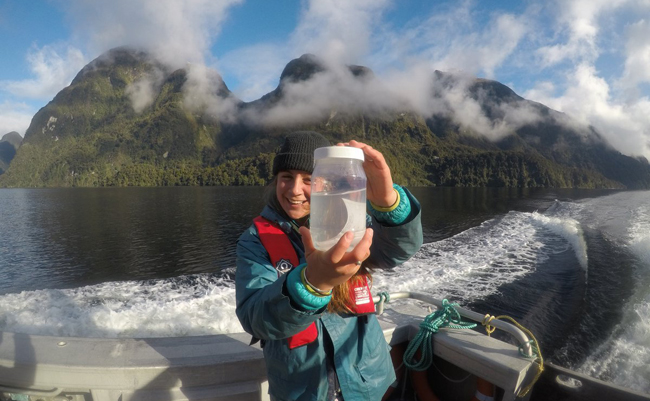Tuesday 9 June 2020 4:37pm

Millie Mannering in Doubtful Sound, Fiordland, with a plankton sample.
Otago Marine Science Master’s student Millie Mannering has been selected as the 2020 Our World Underwater Scholarship Society Australasian Rolex Scholar.
This highly competitive scholarship is designed to provide a hands-on introduction to underwater and other aquatic-related endeavours for a young person considering a career in an underwater-related discipline.
This isn’t the first time Millie has been recognised. In 2018 she was a BLAKE ambassador, sailing from Panama to New York with a team of scientists. Under the latest Scholarship, she will spend a year working alongside a range of current leaders in underwater fields – including active participation in field studies, underwater research, scientific expeditions, laboratory assignments, equipment testing and design, photographic instruction, and other specialised assignments.
Millie tells us her story
I was raised on a farm near the Waimakariri Gorge and spent many weekends exploring the neighbouring mountains in Arthur’s Pass.
It wasn't until a family holiday to a bach on the coast, that I was immediately hooked after watching alien-like creatures in rockpools, inquisitive orca circle our inflatable boat and penguins climb up the sand dunes at night.
I completed a Bachelor of Science in Zoology and Marine Science and continue to be driven by conservation, in particular understanding and protecting marine ecosystems against an extensive suite of anthropogenic impacts.
I’m currently completing a Master’s in Marine Science investigating the effect of microplastic ingestion on predator-prey interactions of coral reef fish.
My fieldwork is based at the Lizard Island Research Station on The Great Barrier Reef and I bring fish tissue samples back to Otago to conduct biochemical analysis examining biomarkers as indicators of oxidative stress and damage.
From research voyages through the depths of Fiordland, to swimming with dolphins in between bioacoustics lectures at Leigh Marine Laboratory, and conducting oceanographic research alongside breaching humpbacks outside the Dunedin harbour - these are just a few of the many highlights from my time at Otago and I’m so grateful to the Marine Science Department and all the passionate staff.
Studying Marine Science is incredibly exciting, but it’s also scary. The Otago coastline is a playground in which we are lucky enough to surf waves with Hector’s dolphin, scuba dive with playful sea lions and watch northern royal albatross and hoiho return from a day feeding at sea. However, all of these endangered species face the imminent threat of climate change, fisheries bycatch, plastic pollution, and many other issues.
The more people discover how beautiful and important our oceans are and understand the threats facing them, the more they will endeavour to protect them. Now more than ever, the importance of research and science communication is evident, and I hope to play a role to further the understanding and protection of our oceans in the future.
